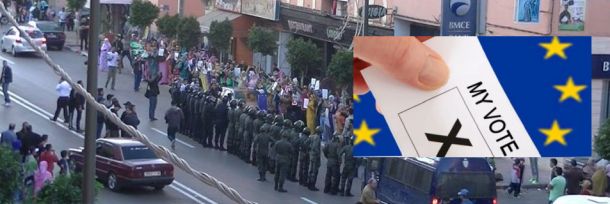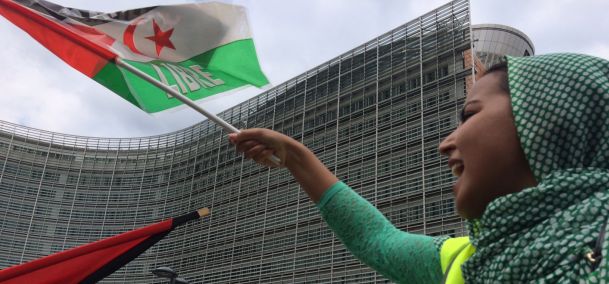While the European Union wouldn’t dream of importing Palestinian agricultural and fisheries products under the Free Trade Agreement with Israel, it appears to have far less problems with importing similar products from Western Sahara under the Free Trade Agreement with Morocco.
It’s a remarkable coincidence: while the European Parliament examines the proposed Free Trade Agreement between the EU and the Palestinian Authority, it is also looking into the Commission’s suggestion to broaden the scope of the Free Trade Agreement with Morocco – which illegally occupies a large part of the territory of its southern neighbour, Western Sahara. But the bitter irony of these two proposals running parallel procedures is seemingly lost on EU officials.
Both propositions by the European Commission set out further trade liberalisation for agricultural and fisheries products. It is now up to Parliament to decide whether or not to support the proposals.
The arrangement with Palestine would allow Palestinian agricultural products, processed agricultural products, as well as fish and other fisheries products duty-free access to the European market. The same logic underpins the trade deal with Morocco – all existing tariffs on the products covered in the deal, will be eliminated over short time span.
But over the last few years, Morocco has intensified its new agricultural commitment in Western Sahara, as part of its strategy to settle the southern parts of the Non-Self Governing Territory. Agricultural activities in the southern region of Oued eddahab-Lagouira have boomed.
A 2010 report by the Moroccan High Commission for Planning states that vegetable harvest in the region has gone up from 11.200 tonnes in 2002-2003 to 325.200 tonnes in 2008-2009 (an increase of 3.000%). The production of fruits increased from 20.000 tonnes to 126.500 tonnes during the same period. Things particularly boomed in the last two seasons of the revised period: in 2007-2008 and 2008-2009, the production of vegetables and fruits showed a successive increase of 6.7% and 30.1%.
Through the proposed EU-Morocco reciprocal liberalisation measures on agricultural and fisheries products, the agreement would not only put these illegal farms in competition with the EU’s own producers, but it would also result in yet another inappropriate sign of legitimacy to Morocco’s untenable claims and illegal possession of its neighbouring country.
The question is: will the EU accept a stamp saying ‘Made in Morocco’ on a product from Western Sahara to allow that product to benefit from the trade preferences under the Free Trade Agreement with Morocco? EU officials avoid answering that question, but the Union’s actions speak volumes.
The EU makes a clear distinction when it comes to importing produce from Israel and the occupied Palestinian territories. But for the upcoming EU-Morocco trade agreement, such a distinction is not made.
According to the EU, Gaza, West Bank and Golan are not part of Israel. It derives that opinion from the relevant UN Security Council Resolutions. As a consequence, the Israel FTA does not apply to aforementioned territories and any produce from those territories cannot enter the EU market stamped as “made in Israel”.
When it comes to Western Sahara – considered a colony pending the process of self-determination by over 100 UN Resolutions – officials of the EU’s External Action Service avoid giving straightforward answers. “We are in no position to comment”, a representative of the EEAS said on 31 August 2011, when MEP Isabella Lövin asked him to explain the difference in these 2 trade agreements during a hearing of the EP’s fisheries committee.
In fact, produce grown in Dakhla, Western Sahara, has already made its way to European supermarkets, labelled as Moroccan. And neither the EU-Morocco Association agreement, nor the envisaged agreement on liberalisation of trade on agriculture and fisheries products foresees rules on requirements for the labelling of products.
A letter of 12 May 2011 by Catherine Ashton, co-signed by 3 EU Commissioners, reads that “To the extent that exports of products from Western Sahara are de facto benefitting from the trade preferences, international law regards activities related to natural resources undertaken by an administering power in a non-self governing territory as lawful as long as they are not undertaken in disregard of the needs, interests and benefits of the people of that territory.”
If products from Western Sahara can 'de facto' enter the EU market as Moroccan, that would be tantamount as de facto recognition.
EU elections: how have candidates voted on occupied Western Sahara?
Are you casting your vote for the EU elections? Find here a complete overview of MEP candidates who have supported the Moroccan occupation of Western Sahara in previous controversial votes. Choose wisely.
UK High Court confirms EU Court rulings on Western Sahara
The UK Court has concluded that the UK government has acted unlawfully in granting preferential tariff treatment to products from Western Sahara through a deal with Morocco, and in granting fisheries quota's for fishing in Western Sahara under a fish deal with Morocco.
EU Court reaffirms position on Western Sahara
Polisario has a case, but it should be pursued when the time is right, Court implies.
Saharawi groups object to EU's Western Sahara trade plans
No less than 93 Saharawi groups have called on the EU institutions to respect the will of the people of Western Sahara when negotiating trade or fisheries agreements that will affect their occupied land.


